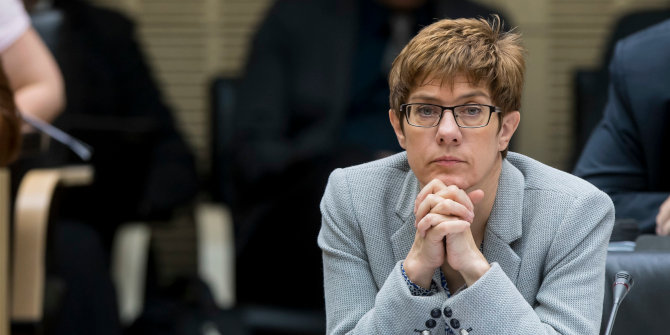 Annegret Kramp-Karrenbauer, who remains the favourite to succeed Angela Merkel as German chancellor, became the new German Defence Minister on 17 July. Marcus Walsh-Führing examines what her appointment means for the CDU and Merkel’s political legacy.
Annegret Kramp-Karrenbauer, who remains the favourite to succeed Angela Merkel as German chancellor, became the new German Defence Minister on 17 July. Marcus Walsh-Führing examines what her appointment means for the CDU and Merkel’s political legacy.
Ever since Annegret Kramp-Karrenbauer (AKK) took over as chair of the German Christian Democratic Union (CDU), the party has had to deal with numerous scandals and challenges, with several members at odds with their new leader. This has undermined the party’s position with the German electorate and raised the possibility of the CDU losing power in the next federal elections, due in 2021.
From day one, CDU members questioned her competency. Political strategists challenged Merkel’s endorsement of AKK by suggesting Jens Spahn, Federal Minister of Health, or Friedrich Merz as alternative leaders to take over the control of the CDU. Spahn has been vocal about his interest in becoming CDU leader, creating fractures in the party. By promoting AKK to the Ministry of Defence in addition to endorsing her as CDU party chair, Merkel has shifted attention away from Spahn and Merz. In the short term, this has allowed Merkel to consolidate her political position, taking advantage of Ursula von der Leyen’s resignation as Defence Minister to pursue her appointment as the President of the European Commission.

Annegret Kramp-Karrenbauer, Credit: © Bundesrat | Henning Schacht (CC BY-NC-SA 2.0)
AKK now has an opportunity to establish herself in a more prominent political role as a stepping stone toward becoming the next Chancellor. But as Defence Minister, she will inherit challenges that have plagued the Ministry for decades. Overseeing the management of the Ministry, which has a budget of more than €40 billion, is a feat in itself. In addition, she will encounter low morale in the German military due to a lack of leadership in the past. Addressing these challenges and limiting political scandals would not only help build AKK’s reputation as a leader, but also provide an electoral boost for the CDU.
Historically, politicians have used the Defence Ministry as a stepping stone for their political careers. Although this played out again in the case of von der Leyen’s appointment to the European Commission, her tenure was subject to an investigation due to a lack of oversight in the awarding of lucrative military contracts. If AKK is unable to establish the required levels of transparency and accountability in office and unify the Defence Ministry, her chances of becoming Chancellor will likely take a hit.
AKK’s performance will have important implications for Merkel’s legacy. If she is successful and can use her period as Defence Minister as a platform to become the next chancellor, Merkel will avoid the prospect of handing power to Spahn or Merz and her vision for the CDU might continue.
With just two years until the next election, there is only a short period of time to invoke any meaningful institutional change in the Defence Ministry. This sets the bar for success at a fairly low level and provides enough flexibility for limited achievements to be spun as a political victory. But history has not been kind to Defence Ministers in Germany, and only time will tell if AKK’s appointment will help consolidate Merkel’s vision of Germany.
Please read our comments policy before commenting.
Note: This article gives the views of the author, not the position of EUROPP – European Politics and Policy or the London School of Economics.
_________________________________
 Marcus Walsh-Führing – Johns Hopkins School of Advanced International Studies
Marcus Walsh-Führing – Johns Hopkins School of Advanced International Studies
Marcus Walsh-Führing is a Postdoctoral Fellow at the Johns Hopkins School of Advanced International Studies (SAIS) Europe.

